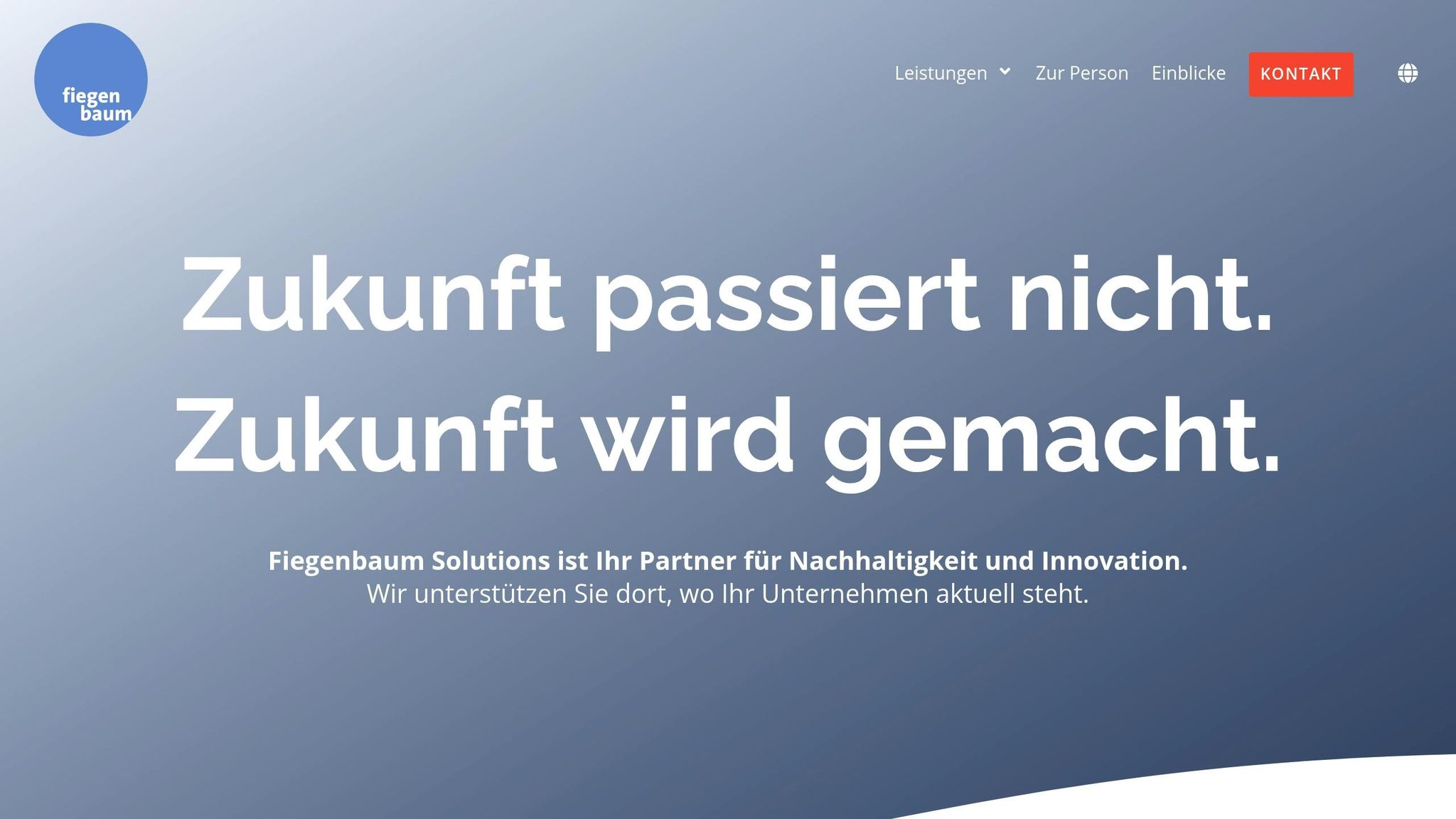How European SMEs Can Boost EBITDA While Achieving ESG Goals with VSME
How can European companies increase their EBITDA while also achieving ESG goals? The answer: VSME (...
By: Johannes Fiegenbaum on 7/29/25 11:48 AM

ESG is the key to long-term business success. Companies that focus on Environmental, Social, and Governance (ESG) not only boost their financial performance but also secure competitive advantages. ESG strategies reduce costs, open up new revenue streams, and minimize risks. In Germany, regulatory requirements such as the Supply Chain Act and the CSRD are driving this development forward. Companies that integrate ESG into their business strategy benefit from more efficient processes, better access to capital, and innovative business models. As global awareness of sustainability grows, ESG adoption is increasingly seen as a core driver for resilience and growth, not just compliance.
Conclusion: ESG is no longer optional—it's a must for staying future-proof and profitable. Now is the right time to embed ESG into your strategy, as both regulatory and market forces accelerate the shift toward sustainability.
The impact of ESG strategies on financial metrics is clearly measurable. A study by Deloitte shows that a 10-point higher ESG score is associated with an approximately 1.2x higher EV/EBITDA multiple. Companies that increase their ESG score by 10 points can even see their EV/EBITDA multiple rise by about 1.8 times. This correlation is echoed in a 2023 McKinsey report, which found that companies with strong ESG credentials enjoy lower costs of capital and improved operational performance (source).
ESG strategies influence EBITDA through four main levers: cost reductions achieved through resource efficiency and waste avoidance, new revenue streams via innovative business models like Vaude’s outdoor products made from recycled materials, risk minimization through stronger compliance, and improved access to capital supported by rising demand for sustainable investments. For example, Unilever’s Sustainable Living Brands grew 69% faster than the rest of its business and delivered 75% of the company’s growth in 2019 (source).
The social aspect also plays a central role: A study of German companies shows that a higher social rating has a significantly positive impact on EBITDA. Additionally, companies that prioritize sustainability often pay higher dividends to their shareholders, reflecting increased investor confidence and long-term value creation (source).
These effects highlight how important it is to firmly embed ESG into corporate strategy, as the financial upside is both tangible and sustainable.
For ESG to have real impact, it must be deeply integrated into business strategy, the business model, and the leadership level. Stakeholder engagement is crucial here to achieve sustainability goals while boosting financial performance. Companies that treat ESG as a side project leave valuable potential untapped. According to PwC, 83% of consumers think companies should be actively shaping ESG best practices, and 86% of employees prefer to support or work for companies that care about the same issues they do (source).
Microsoft is a good example: The company integrates social aspects into its strategy, commits to human rights and LGBTQ+ equality, and offers internal childcare for employees. Allianz Global Investors also applies ESG criteria in portfolio analysis and manages sustainable investment funds, demonstrating that ESG integration can drive both employee engagement and investor trust.
Governance performance in particular shows the strongest impact on financial metrics compared to environmental and social factors. Transparent ESG reporting—such as compliance with the German Sustainability Code and GRI guidelines—strengthens stakeholder trust. According to a survey, 89% of global investors also want unified standards for measuring ESG performance (source).
A look at German market data shows how deeply ESG is already anchored in practice and why companies cannot afford to lag behind.
The financial benefits of ESG are also reflected in current market figures. The German ESG investment market generated revenues of $1,815.9 million in 2024. An analysis of German companies from 2010–2014 also confirms that ESG performance has a positive effect on return on assets (ROA). Furthermore, a 2022 study by the German Sustainable Finance Research Platform found that companies with robust ESG practices had a 15% higher ROA than their peers (source).
The integration of sustainability in German companies peaked in 2022, driven by growing stakeholder pressure and stricter sustainability regulations. At the same time, investors and lenders are increasingly demanding ESG-related information, making ESG a decisive factor for capital raising and company valuation. The Bundesverband Investment und Asset Management (BVI) reports that sustainable investments in Germany reached over €500 billion in 2023, underlining the rapid market shift (source).
For German companies, it is crucial to identify those ESG initiatives that offer the greatest financial and operational benefits. Three areas stand out: regulatory compliance, operational efficiency, and product innovation. These levers complement the already well-known direct impacts of ESG on EBITDA and open up new growth opportunities. Below, we take a closer look at these key value drivers, contextualized within the evolving European regulatory landscape and shifting investor expectations.
Regulatory requirements in Germany have increased significantly in recent years. With the Supply Chain Act (LkSG), which has been in effect since January 2023, companies with more than 3,000 employees—and from 2024, those with more than 1,000 employees—are required to uphold human rights and environmental standards throughout their entire supply chain. Violations can result in fines of up to 8 million euros or 2% of global annual turnover, if turnover exceeds 400 million euros.
One example of the impact of this regulation is Volkswagen. The group had to fundamentally overhaul its supplier processes for more than 40,000 partners and implement a new due diligence system. In the financial sector, investments in compliance are also substantial: Leading EU financial institutions invest between 5 and 15 million euros to meet DORA (Digital Operational Resilience Act) requirements and avoid penalties. The European Banking Authority has also highlighted that ESG risks are now part of supervisory reviews, making compliance not just a legal necessity but a strategic imperative (source).
Such investments pay off, as they not only prevent hefty fines and reputational damage but also strengthen the trust of regulators and leadership bodies, positioning companies as responsible market leaders.
Beyond regulatory compliance, improving operational efficiency is a key lever for ESG success. Measures in this area directly impact the cost structure and thus positively influence EBITDA. Currently, only 13% of raw material consumption in Germany is covered by secondary raw materials, offering enormous savings potential.
The National Circular Economy Strategy (NCES) sets clear targets: By 2045, per capita raw material consumption is to be halved from the current 15 tons to around 8 tons. In addition, Germany plans to double the share of recycled materials by 2030 and reduce municipal waste by 10%. According to the Ellen MacArthur Foundation, circular economy initiatives could generate €1.8 trillion in economic benefits across Europe by 2030 (source).
Significant savings are especially evident in the construction sector. Reusing existing buildings can reduce CO₂ emissions by up to 60% compared to demolition and new construction. Dr. Ing. Weidner of Werner Sobek highlights the importance of optimal use of the existing building stock. Similarly, the German Energy Agency (dena) estimates that energy-efficient retrofits can cut operational costs by up to 30% (source).
Furthermore, companies can future-proof their business models by offering repair and refurbishment services. These approaches increase material value, reduce waste, and create new revenue opportunities at the same time, aligning with both regulatory goals and consumer demand for sustainable products.
Developing innovative products and business models in line with the circular economy opens up new revenue streams and differentiation opportunities for companies. A good example is Mannheim-based CITY DECKS, which generates annual revenues of around 3.3 million euros by using resource-efficient construction methods and materials from sustainable, regional supply chains.
In collaboration with EY, CITY DECKS has defined three key action areas: analyzing the business model for circular alternatives to reduce costs, measuring all sustainability measures for transparent reporting, and developing solutions for decarbonization. According to Accenture, companies that embrace circular business models can improve profitability by up to 14% compared to traditional linear models (source).
Andrea Potrafke, authorized signatory at CITY DECKS, summarizes the economic opportunities of sustainability as follows:
“Sustainability in urban design creates clear economic opportunities. The circular economy not only offers an opportunity for the environment but also holds economic potential for our company.”
These developments are also reflected in market forecasts: The German ESG investment market is expected to expand at an annual growth rate of 20.7% between 2025 and 2030, underscoring the urgency for companies to innovate and adapt.
Implementing ESG strategies requires clear structures and methods to select the right framework. After examining the financial and operational impacts of ESG, these frameworks focus on practical implementation. They complement the value drivers described above by helping companies efficiently put ESG initiatives into practice. Below, we look at three approaches that have proven particularly helpful for German and European companies navigating the evolving ESG landscape.
With life cycle assessment, companies can analyze and systematically improve their environmental impact across the entire life cycle of a product. An example from the construction industry illustrates the relevance: In 2022, this sector was responsible for 37% of global CO₂ emissions—about 14 gigatons. A multi-stage LCA approach considers various levels such as components, facilities, and networks to provide targeted insights into technologies, operations, and overall impact. For German companies, integrating such methods is especially valuable, as it enables not only ecological but also economic benefits such as cost reductions and efficiency gains. According to the World Business Council for Sustainable Development, LCA adoption can reduce product-related emissions by up to 30% (source).
In addition to quantitative analysis via LCA, materiality analyses offer another way to better define the financial impact of ESG factors.
Materiality analyses help companies identify the ESG topics with the greatest impact on financial success. According to a study, over 80% of CEOs believe that investments in sustainability will lead to better business results in the next five years (source). Institutions like Wellington Germany Institutional support this process by providing materiality frameworks, creating stakeholder lists, offering survey templates, and assisting with the selection of external service providers. The collected data flows into a materiality matrix, enabling companies to highlight key topics and prioritize risks. This approach can positively influence business development in the long term, as materiality-driven ESG reporting is increasingly demanded by investors and regulators alike.
The prioritization of key ESG factors is further facilitated by modern data solutions that enable systematic implementation and real-time performance tracking.
More and more German companies are using specialized ESG data solutions to measure, manage, and report their ESG performance. These systems help meet legal requirements and fulfill stakeholder expectations. Modern ESG software improves data collection, increases accuracy, and ensures compliance. Practical examples show how such technologies are used: Porton Pharma Solutions Ltd. has introduced a membrane wastewater treatment system, SKSHU Paint Co. Ltd. produces water-based paints, and Shanying International Holdings Co. Ltd. uses innovative technologies for water conservation (source).
Despite progress, the availability and quality of ESG data remain key challenges. Reliable and consistent data are essential for sound performance assessment. Companies should therefore prioritize key ESG factors, set clear and measurable goals, and foster a strong ESG culture to overcome potential implementation hurdles. Caution is also advised: Violations of the CSR-RUG can result in fines of up to €10 million. Integrating ESG principles into core business strategy therefore not only protects against risks but also strengthens the company profile, convinces investors, and creates sustainable long-term value.

After presenting the underlying frameworks and tools, it becomes clear how Fiegenbaum Solutions translates these into concrete, EBITDA-boosting measures. Johannes Fiegenbaum combines regulatory know-how with entrepreneurial thinking to create measurable value through sustainable transformation.
The core task is to design ESG initiatives so that they not only meet legal requirements but also deliver financial benefits. This shows how ESG measures go beyond compliance and contribute to increased financial success. Fiegenbaum Solutions develops tailored solutions that are precisely aligned with the financial goals of German companies, leveraging both international best practices and local regulatory expertise.
Fiegenbaum Solutions conducts detailed analyses of business models and value chains to identify key ESG priorities using double materiality analysis. This approach considers both the company’s impact on the environment and society, as well as the financial risks and opportunities associated with ESG factors.
The strategy is closely aligned with corporate goals and industry-specific requirements. In addition to meeting short-term compliance requirements, the focus is on creating long-term competitive advantages. These include net zero strategies, decarbonization pathways, and embedding ESG criteria in core business strategy, ensuring that sustainability is a driver of innovation and profitability.
To meet the complex requirements of the Corporate Sustainability Reporting Directive (CSRD), the EU Taxonomy, and other regulations, Fiegenbaum Solutions offers comprehensive support. This includes the introduction of risk management systems, the development of policies, and the establishment of internal complaints procedures.
| Measure | Description |
|---|---|
| Risk management system | Identification, assessment, and mitigation of risks in the supply chain |
| Definition of responsibilities | Appointment of a responsible person |
| Risk analysis | Regular review for possible violations |
| Policy statement | Setting human rights objectives |
| Preventive measures | Preventing potential violations |
| Remedial measures | Intervening in existing or imminent problems |
| Internal complaints system | Secure and accessible procedure for complaints |
| Documentation | Detailed recording of all processes and obligations |
A key focus is on timely preparation for the CSRD reporting obligation. Fiegenbaum Solutions ensures that companies are not only compliant but can also use reporting as a strategic tool for value creation. This solid foundation enables data-driven success measurement, which is explained in more detail in the next section.
With the help of life cycle assessments (LCA), impact modeling, and scenario analyses, Fiegenbaum Solutions determines the impact of ESG measures on EBITDA growth.
By using modern ESG data solutions, the company optimizes data collection and reporting accuracy. This combination of quantitative analysis and strategic consulting helps target ESG investments where they deliver the greatest financial benefit.
In addition, Fiegenbaum Solutions supports the development of new, impact-oriented business models that integrate circular economy principles and open up additional revenue streams. Efficiency potentials and cost savings are identified, offering both economic and ecological advantages, and ensuring that ESG is a true driver of business transformation.
ESG is far more than a trend—it is a central engine for business success. German companies that consistently integrate ESG strategies into their business models not only secure new business opportunities but also strengthen their competitiveness in an increasingly sustainable economy.
The market figures speak for themselves: In 2021, the market for sustainable financial products in Germany grew by over 50% and reached a volume of more than 0.5 trillion euros. Responsible investments totaled 2.2 trillion euros, with 80% of these investments using ESG criteria as a basis (source). ESG has thus become a decisive factor in capital decisions, influencing both investor behavior and company valuations.
“The results show: ESG unites environmental, social, and governance goals and thus promotes sustainable growth. There is some uncertainty about what ESG actually means for portfolios in terms of performance, risk, and investment vehicles, but these results show that investors are already investing in the sustainable transformation.”
Practical examples from Germany show how ESG is implemented in reality: The SRH Zentralklinikum Suhl was able to reduce its lighting electricity consumption by 150,000 kilowatt hours per year by using LED technology. N-Tec in Leverkusen covers 33% of its energy needs with a 98 kWp solar system, saving around 10,000 euros annually. Salzgitter Flachstahl reduced its energy consumption by 54%, while Krones AG achieved a 50% energy saving through waste recycling. These examples illustrate how targeted ESG measures not only cut costs but also foster sustainable growth and resilience (source).
Holistic ESG strategies offer companies the opportunity to minimize risks, seize opportunities, and strengthen their market resilience. Given that 76% of consumers avoid companies that ignore environmental, employee, or community concerns, and 89% of investors include ESG criteria in their decisions (source), ESG is becoming the central foundation for value creation and future security.
But change requires more than superficial measures. Successful companies integrate ESG factors deeply into their business strategies and use data-driven analysis to invest where the greatest added value is created. With a clear and targeted implementation of the ESG strategies presented here, ESG does not become an additional burden, but a driver for sustainable growth and long-term success.

ESG and sustainability consultant based in Hamburg, specialised in VSME reporting and climate risk analysis. Has supported 300+ projects for companies and financial institutions – from mid-sized firms to Commerzbank, UBS and Allianz.
More aboutHow can European companies increase their EBITDA while also achieving ESG goals? The answer: VSME (...
Sustainability reports are more than just an obligation—they can deliver real business benefits....
The EU Taxonomy offers startups clear advantages and opportunities for sustainable growth. It...